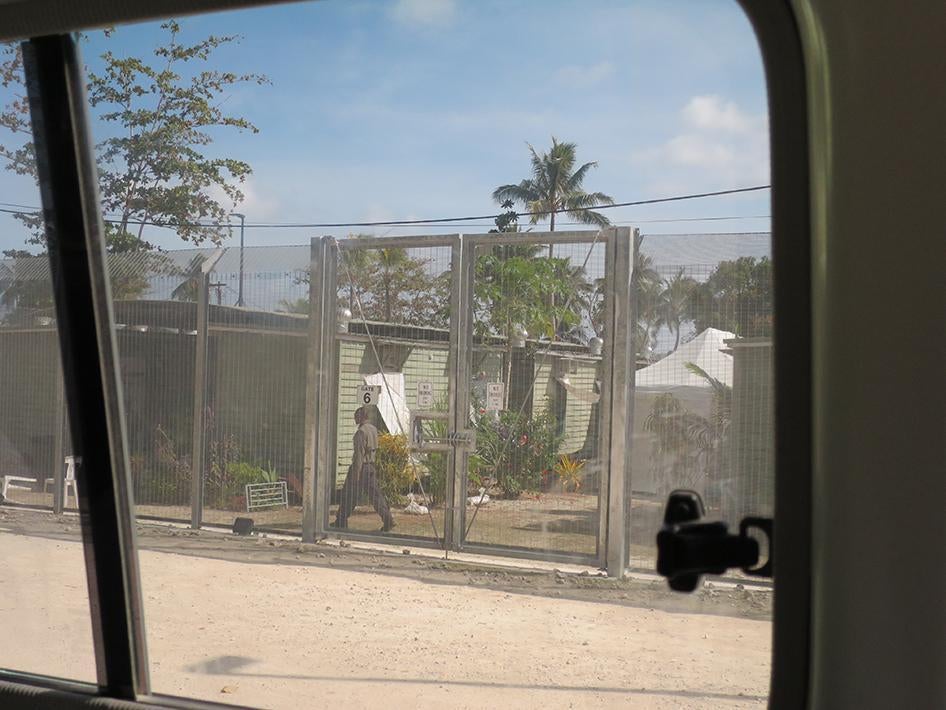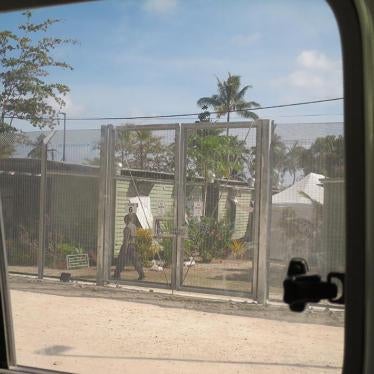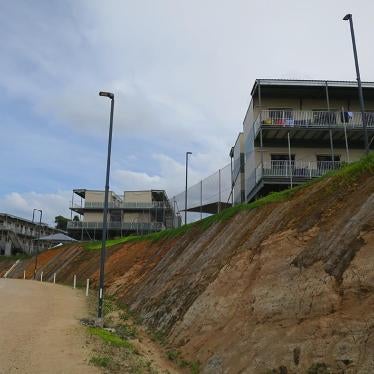|
Dispatches
Dispatches: You Got it Right the First Time, Mr. Turnbull
On September 23, Australia’s new prime minister, Malcom Turnbull, expressed concern about asylum seekers Australia has transferred offshore, saying, “I have the same concerns about the situation of people on Manus and Nauru ... as I think all Australians do.”
But several hours later, he took a more hardened view: “Let me be absolutely clear, there will be no resettlement of the people on Manus and Nauru in Australia. I know that’s tough ... you could say it is a harsh policy, but it has worked.”
Worked for whom? I visited Manus Island in June. I saw firsthand the devastating toll of what is effectively indefinite incarceration for years in overcrowded and dirty conditions followed by a no exit entrapment on a remote island for refugees who fled persecution and sought Australia’s protection.
“I am very afraid. I was beaten in Iran. I was beaten in detention,” one recognized refugee on Manus told me. “I’m looking for safety but I haven’t found it.”
Australia’s experiment in offshore detention has been a disaster for the asylum seekers and refugees bearing the brunt of the policies. More than three years after Australia first started sending asylum seekers to Manus Island, just over 1,500 men, women, and children are today locked up there and on Nauru in what are euphemistically termed “regional processing centers.”
On Manus, most refugee claims have not been processed. But even the 41 whom the authorities have recognized as refugees have seen little improvement in their situation; although released from detention, they can’t work, study, or leave the island.
“Why does Australia call this a processing center?” one Manus refugee told me. “There is no processing going on. I’ve been here two years and we’re all still stuck on this island. Can’t work, nothing to do. There is no future for us here.”
An Australian Senate inquiry heard numerous allegations of physical and sexual assault, and harassment against asylum seekers by staff at the Nauru center, and called on the government to stop sending children there.
United Nations agencies and mechanisms including the UN high commissioner for human rights, the high commissioner for refugees, the Human Rights Committee, and the special rapporteur on torture, have criticized Australia for its flouting of international law and mistreatment of asylum seekers.
Former prime minister Tony Abbott tried to deflect such criticism, saying that Australians are “sick of being lectured to by the United Nations.” Now Australia is running for a seat on the UN Human Rights Council in 2018-20. If it wants to stop being lectured to, and would also like to strengthen its bid, Australia should engage constructively with the UN and clean up its own act on rights issues. Australia’s policy on asylum seekers is an excellent place to start.
When Turnbull challenged Abbott for their party’s leadership, he said, “We need advocacy, not slogans.… There must be an end to policy on the run.”
It’s time for Turnbull to act on his concerns. His best move, of course, would be to stop the policy of diverting asylum seekers to Nauru and Manus Island and for Australia to take direct responsibility for examining refugee claims. Failing that, for starters, he should open up access to offshore detention centers to journalists, lawyers, and rights organizations. Turnbull should encourage the PNG government to promote and facilitate resettlement of recognized refugees from Manus Island to the PNG mainland and beyond, and immediately allow them to work and have freedom of movement in the country. If PNG doesn’t do the right thing, the Australian government should at least reverse its current policy and green light resettlement of recognized refugees from these offshore processing sites to Australia.
Your tax deductible gift can help stop human rights violations and save lives around the world.
Region / Country
Most Viewed
-
June 3, 2025
“They’re Ruining People’s Lives”

-
January 25, 2024
“We’re Dying Here”

-
November 25, 2019
A Dirty Investment

-
April 27, 2021
A Threshold Crossed

-
November 19, 2012
Losing Humanity






